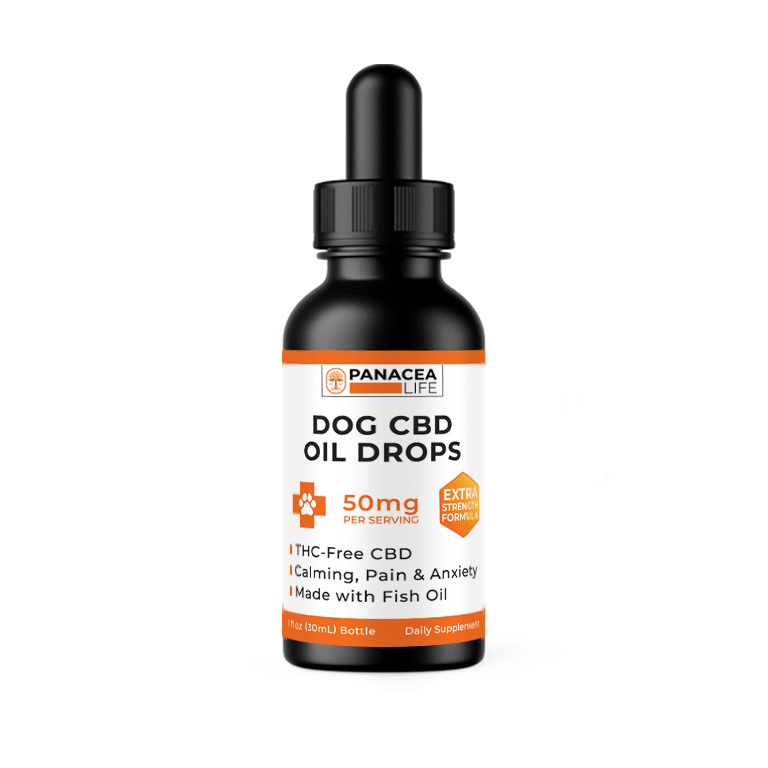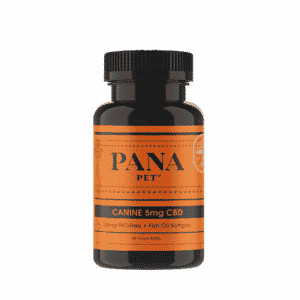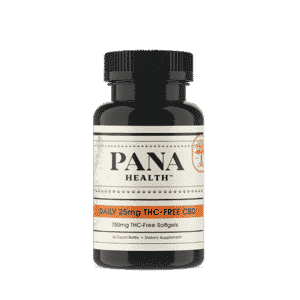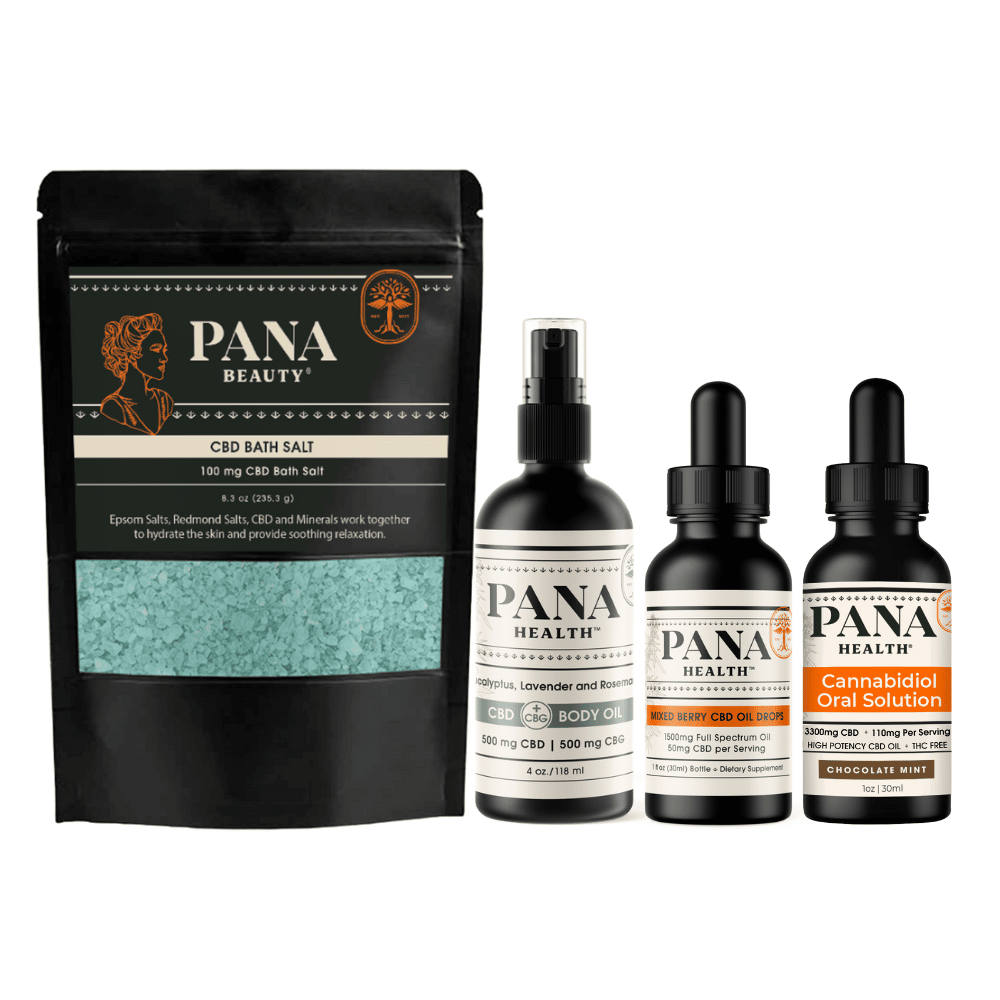Cannabidiol (CBD) is used as a management aid for humans suffering from many different difficulties, and now pet owners are looking to manage similar situations in their pets using CBD.
CBD is derived from a natural source and shows minimal side effects at the proper dosage, so it can be an excellent choice for pets that may be suffering. CBD use in pets is growing in popularity, so much so that according to a Healthline survey, 63% of vets from a group of 2131 reported being asked about CBD treatment at least once per month.
Before starting your pet on any new supplement, including CBD, it is crucial to seek advice from a vet and ask the right questions. You should especially ask if your pet is on any other medications. CBD is broken down by the liver and it can become overwhelmed when asked to break down too many foreign substances in the body at once. Although vets are currently not able to prescribe CBD, they can help pet parents make an informed decision for their furry friend.

Is Cannabidiol right for my pet?
The first question you should be asking is, is this type of treatment necessary, and will it be beneficial for my pet’s condition? A veterinarian will understand your pet’s health better than anyone else and will know whether use of CBD would be a suitable option.
Although CBD may seem like the ideal treatment for many conditions, it is essential to discuss this with your vet to decide if this is an appropriate course of action for your pet – especially in cases of hormone disorders, tumors, or organ dysfunction.
Asking for a professional opinion about whether CBD is right for your pet will ultimately help ensure they’re given the best care as well as avoid adding extra medication, difficulty, and expense to your life. If you’re interested in using it as a preventative measure, CBD makes a great addition to your pet’s first aid kit.
What kind of conditions can CBD help manage?
There has been much research looking into how CBD may be able to help things like epilepsy, inflammation, and achieving a positive state of mind.
Unfortunately, there are not many medical studies on pets which examine the effects of CBD to confirm the exact results and dosing for pets. Therefore, it is a great question to ask your vet and see what their experience is with CBD at their clinic or hospital.
As there are still limited studies on the use of Cannabidiol for specific animal health conditions, it’s best to find a vet clinic that has had success in using this medication for a particular health condition. If your usual vet does not have personal experience with CBD treatments, you can ask them if they know of other vets who may have.
Will my pet experience side effects?
This is a great question to ask your vet so that you can be aware of all side effects caused by CBD once taken. According to the American Kennel Club, your pet may experience dry mouth, lowered blood pressure, or drowsiness.
Your vet should have some knowledge based on past cases (whether through their own direct experience or veterinary literature) and will be able to share what you should expect and how to approach it.
It is essential to know what to expect after your pet has its CBD so that you are not surprised. Confer with your vet about what dosage is most appropriate for your pet’s breed, size, sex, age, and activity level. At the correct dosages, the odds of undesired effects should be limited.
Will CBD interact with my pet’s other medication?
This is a crucial question to ask your vet if you are already currently giving your pet medication. It is essential to know how they interact together. It is also vital to be sure whether the medicines are safe to use with CBD. If you are seeing a new vet, you must disclose all medications your pet is currently on so that they can safely manage the health of your pet and determine whether CBD oil is a suitable option.
How quickly can we expect results?
Understanding how CBD will work for your pet will give you an idea of what you should expect to see and how quickly any changes will occur. Depending on the case, efficacy may show after different periods. Reoccurring problems may require longer dosing schedules than temporary ones.
Before shrugging off a treatment as non-effective or useless, try to give two weeks for the full effect. Your vet can give you an idea of what behaviors or effects to keep an eye out for to ensure your pet is handling it well. It is a good idea to keep a 7-14-day logbook to monitor your fur baby’s health and condition during this time of treatment. This is useful in concluding whether there has been an improvement in their state. It can also help in deciding if nothing has changed at all.
Can I tell others that my pet is taking CBD?
It’s essential that you feel entirely comfortable giving CBD to your pet once you have spoken to your vet. For the time being, CBD cannot be prescribed by veterinarians who may make owners feel cautious about announcing that their pet is on this treatment.
It would be beneficial to ask your vet how to approach the subject if someone asks you about giving this type of medication to your pet. Your vet will be able to provide you with an informed, medical, and professional approach to your reasoning.
It’s important to note that if your pet needs to go to another veterinary clinic, for instance, an emergency clinic or a specialist, then you must disclose all medications your pet is on, including CBD.
How much will it cost?
Although we wish cost didn’t have to be a consideration when it comes to our little fur babies, it is good to know where CBD stands in terms of price.
Working out the cost per serving can be an effective way to see whether CBD is a viable option for your family, and perhaps per bottle, it works out more affordable.
You’ll need to weigh up other considerations besides cost, such as wanting your pet to be on a more natural substance or reducing side effects that are caused by pharmaceuticals.
Where can I source CBD for my pet?
The quality of CBD varies hugely depending on its manufacturing process and where you are sourcing it, so it is essential to know that your pet’s medication is of high quality and coming from a reputable source.
It’s essential to do your research on any potential suppliers of CBD products for your pet. Again, your vet should be able to assist and (possibly) suggest options. Ultimately, you will need to make your judgment based on the reputation of the supplier, the advice of your treating vet, and what you believe will be best for your pet.
When assessing an online provider of CBD, look for a Certificate of Analysis guaranteeing the CBD content. This Certificate should have on it the name of an independent testing facility.
Many pet owners are looking for more alternative medications for their pets and finding success with using cannabidiol to support their pet’s condition and improve their quality of life. Pets are a big part of the family, and we want to do anything we can to help them feel more comfortable and happier. Still, it is always important to seek veterinary advice before changing or introducing new things into your pet’s diet.
We look forward to many more studies taking place supporting the use of CBD in pets and keeping you well informed so you and your fur babies can live your best lives! To learn more about CBD and pet care, check out How to Build a First-Aid Kit for pets!
















